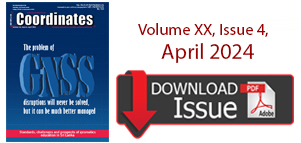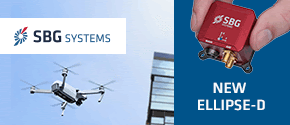Articles in the Galileo Update Category
Since its certification for use in managing air traffic and other securitycritical applications in 2011, EGNOS – Europe’s augmentation system for GPS – now enables new applications for precise and reliable satellite navigation. To promote EGNOS, the European GNSS Agency (GSA) is offering a special prize for the most promising idea using the system.
Galileo PRS signal reception Septentrio and QinetiQ, working in close partnership with the European Space Agency (ESA) and their industrial partners, achieved the world’s first successful reception of the encrypted Galileo Public Regulated Service (PRS) signal from the first Galileo satellites (launched in November 2011).
With an aim to pinpoint distress calls for rapid search and rescue, Galileo navigation system will be harnessed, announced European Space Agency (ESA). It will test expansion of the humanitarian system over the next two years to make it more effective. In addition to conveying distress signals to search and rescue organisations, Galileo will also provide a novel service known as Return Link Service. Under this innovative service, the satellite will send a reply to those in distress, letting them know that their signal was picked up and help is on the way.
European Commission Vice President Antonio Tajani has announced that the consortium led by OHB System AG and Surrey Satellite Technology Ltd (SSTL) will build a further eight satellites for the European Union’s Galileo satellite navigation programme under the supervision of the European Space Agency.
On 16 January, the second of the two Galileo In-Orbit Validation (IOV) satellites, FM2 (Flight Model 2) also known as GSAT0102, started transmitting navigation signals on the L1/E1 frequency using the E12 ranging code, according to tracking reports from the COoperative Network for GIOVE Observation (CONGO). FM2 was launched together with PFM, the ProtoFlight Model (GSAT0101), on October 21, 2011.
Europe’s Galileo system has passed its latest milestone, transmitting its very fi rst test navigation signal back to Earth. According European Space Agency (ESA), the different Galileo signals are being activated and tested one by one. Soon after the payload power amplifi ers were switched on and ‘outgassed’– warmed up to release vapours that might otherwise interfere with operations – the fi rst test signal was captured at Redu. The test signal was transmitted in the ‘E1’ band, which will be used for Galileo’s Open Service once the system begins initial operations in 2014. The Open Service will be freely available to users all over the world. This signal is particularly important because it shares the ‘L1’ band of the US GPS navigation satellites.
The Commission proposes to earmark €7 billion to guarantee the completion of the EU satellite navigation infrastructure and to ensure the exploitation of the systems until 2020, such as the operations of the space and terrestrial infrastructures, the necessary replenishment/replacement activities, certification procedures, and notably the provision of services.
Europe has taken a major step in its history by launching the first two operational Galileo satellites with a Soyuz launcher to reach their orbit at 23.000 kilometres. From 2014, the new constellation will enable improved services ranging from more precise in-car navigation, effective road transport management, search and rescue services, more secure banking transactions as well as reliable electricity provision, which all rely heavily on satellite navigation technologies to work efficiently. The overall economic impact is estimated to be around 90 billion euro over the next 20 years.
SciSys wins satellite project contract: SciSys, the specialist supplier of bespoke software systems, IT based solutions and support services, has been awarded a contract to support the Full Operational Capability (FOC) Phase of Europe’s Galileo System. This was achieved after successful completion of the European Union (EU) competitive dialogue process and final negotiations with Astrium UK as the prime contractor for the Galileo Ground Control Segment. The SciSys baseline contract is worth around €2m and will run until the end of 2013, with an optional maintenance extension into 2014.
Brussels Celebratory Launch Events: The launch of the two operational Galileo IOV (In-Orbit Validation) satellites on 20 October is a first in the history of the European Union. It is a moment to celebrate this unique and ambitious European collaboration.







 (5.00 out of 5)
(5.00 out of 5)